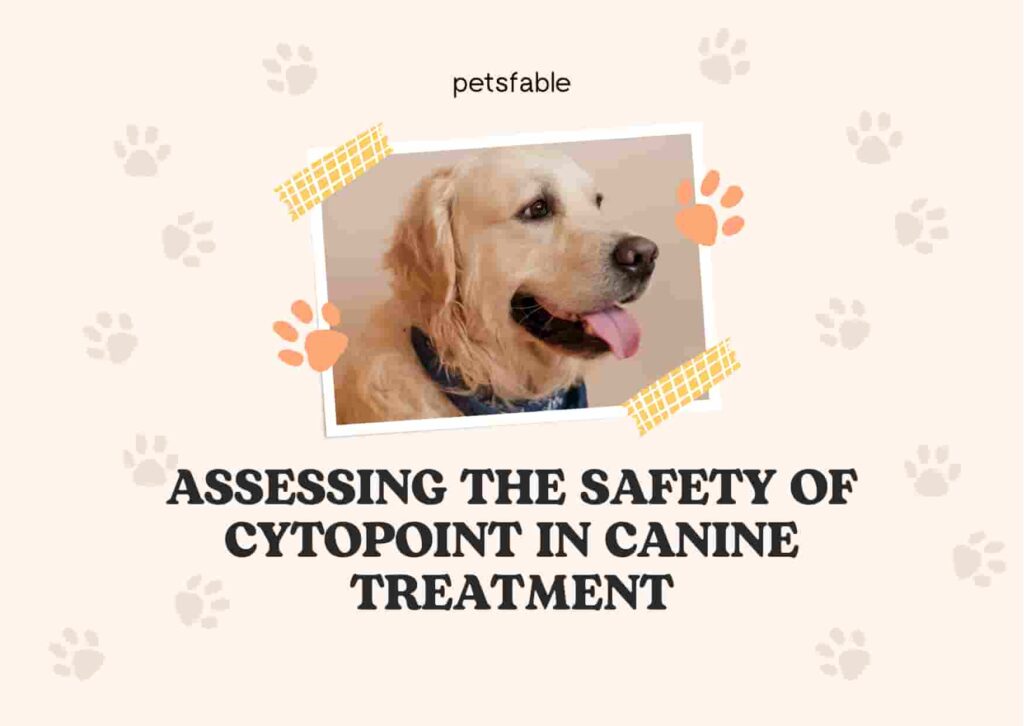Assessing the Safety of CYTOPOINT in Canine Treatment
As a veterinarian, I urge caution when considering the use of CYTOPOINT for dogs. My professional experience and observations have raised concerns about the potential for serious or even life-threatening side effects associated with this medication.
CYTOPOINT works by inhibiting a crucial pathway that plays a vital role in regulating various physiological processes in dogs.
Why Caution is Essential with CYTOPOINT
The mechanism by which CYTOPOINT operates can interfere significantly with important biological functions, potentially leading to severe health implications.
Given the critical nature of the pathways affected by this drug, it is essential for dog owners to be aware of the possible risks and discuss alternative treatments with their veterinarians.
Key Points for Dog Owners
- Understand the Risks: Be informed about the potential severe side effects of CYTOPOINT, which may impact your dog’s health significantly.
- Consult Your Veterinarian: Always discuss the benefits and risks of any medication with a professional to determine the safest course of action for your pet.
- Explore Alternatives: Consider other treatments that might pose fewer risks and discuss these options thoroughly with your vet.

Prioritizing Canine Health
My priority is the health and safety of all canine patients. In light of the concerns regarding CYTOPOINT, I recommend considering safer alternatives and engaging in a thorough discussion with your vet to ensure the best care for your dog.
My Tragic Experience with CYTOPOINT: A Cautionary Tale for Dog Owners:
Understanding CYTOPOINT
Cytopoint is a medication prescribed by veterinarians to alleviate symptoms of atopic dermatitis in dogs, a chronic skin condition that causes inflammation and itchiness.
It specifically targets and neutralizes a protein called canine interleukin-31 (IL-31), which is a primary factor in inducing itchiness in affected dogs, thereby reducing discomfort and promoting skin healing.
Is Cytopoint Safe for All Dogs?
As the latest treatment option in the growing field of canine allergies, CYTOPOINT was developed as a promising alternative to older medications like Atopica and Apoquel, which are known for their immunosuppressive side effects.
Read more: Is Cytopoint Safe for All Dogs
CYTOPOINT , being a monoclonal antibody therapy, is celebrated for its targeted action and minimal impact on overall immune function, making it a favored choice among veterinarians.
How Does CYTOPOINT Work?
CYTOPOINT functions as an injectable treatment that simplifies the management of canine allergies without necessitating steroids, antibiotics, or other topical treatments.
This medication is designed to provide long-lasting relief from dermatitis symptoms with fewer side effects, enhancing both the pet’s quality of life and the owner’s convenience.
Evaluating the Risks and Benefits
While CYTOPOINT is effective in managing dermatitis symptoms for extended periods, it is not without risks. Side effects may include minor issues such as vomiting and diarrhea, and in rare cases, more severe reactions may occur.
The veterinary community generally supports its use due to the low incidence of serious side effects compared to the significant benefits it offers.
Our Personal Journey with CYTOPOINT
The Decision to Use CYTOPOINT
Driven by the hope of relieving our dog’s severe allergies, which had caused many sleepless nights and constant discomfort, we decided to try CYTOPOINT.
Initially, it seemed to be the solution we had been desperately seeking, as it quickly alleviated the relentless scratching and discomfort.
The Devastating Outcome
Unfortunately, the initial relief was short-lived. Within weeks of starting treatment, our dog began to show signs of serious health issues, including lethargy and a significant loss of appetite.
His condition deteriorated rapidly, displaying more severe symptoms that ultimately led to his untimely passing. Despite our vet’s efforts, we were left to face the heartbreak of losing a beloved family member.

Reflections and Key Learnings
This experience has profoundly impacted our views on managing pet health. It underscored the importance of being fully aware of the potential risks associated with medical treatments, even those that are rare.
In retrospect, understanding all possible outcomes, no matter how infrequent, is crucial for making informed decisions about our pets’ health care.
Also read: The-fascinating-world-of-black-cats-with-orange-eyes
Final Thoughts
While CYTOPOINT offers many dogs significant relief from dermatitis, it is vital for pet owners to discuss all potential risks and benefits with their veterinarian. Every treatment comes with its own set of risks, and what is rare does not mean impossible.
Our story is a poignant reminder of the critical need to weigh every medical decision carefully, keeping the well-being of our cherished pets at the forefront.
My Loss to CYTOPOINT : Insights for Dog Owners
Connecting with Others
In seeking answers about our experience with CYTOPOINT , we found solace in connecting with others who had faced similar losses.
Despite being rare, adverse reactions to CYTOPOINT are not unheard of, forming a community online that shares experiences and seeks improvements in pet care.
Evaluating Cytopoint Scientifically
CYTOPOINT is generally considered safe and effective for most dogs, with research supporting its use.
However, each report of adverse reactions highlights the complexities of veterinary medicine and underscores the need for ongoing research to enhance safety and predict adverse responses.
Informed Decisions in Pet Healthcare
This experience highlighted the importance of informed consent in veterinary care. Pet owners should feel confident to ask about potential side effects, explore alternative treatments, and understand the reasons behind certain medical recommendations.
Seeking a second opinion is also a wise step for additional reassurance.
Coping with Loss and Advocating for Change
Dealing with Grief
Losing a pet is deeply distressing. Finding support through groups, counseling, or commemorating your pet can aid in the grieving process. It’s vital to give yourself time to mourn and gradually heal.
Promoting Safety and Transparency
By sharing our story, we aim to foster greater transparency and enhance safety in pet treatments. Our advocacy contributes to a broader effort to ensure such tragedies are prevented in the future.
Continuing Our Advocacy
Our commitment extends to supporting safer veterinary practices and further research into treatment impacts. As we heal, we hold dear the memories of our beloved pet, appreciating the happiness and love he brought to our lives.
Also read: 10-essential-things-to-know-before-frosting-dog
Conclusion
Our story is a somber reminder of the care needed when making health decisions for our pets.
It stresses the importance of thorough understanding and cautious optimism as we navigate treatment options for our beloved animals, ensuring their well-being remains a top priority.
FAQ’s:
Is Cytopoint safe for all dogs?
Cytopoint is generally safe for most dogs; however, as with any medication, there is a potential for adverse reactions. It’s important to consult your veterinarian about your dog’s specific health needs before starting treatment.
What should I do if my dog experiences adverse reactions to Cytopoint?
If your dog shows any worrying symptoms after receiving Cytopoint, seek immediate veterinary care to ensure timely and appropriate treatment.
How can I report a severe side effect related to pet medications?
Severe side effects should be reported to your veterinarian, who can then relay the information to the drug manufacturer or appropriate regulatory authorities.
Where can I find support if I’ve lost a pet under similar circumstances?
Support is available through various organizations and online communities that provide resources and connect you with others who have experienced similar losses.
How can I make informed decisions about new treatments for my pet?
To make well-informed decisions, conduct thorough research, ask detailed questions, and consider getting a second opinion if necessary. Understanding the risks and benefits is crucial for informed consent.
What are the dangers of Cytopoint for dogs?
While Cytopoint is effective for many dogs, allergic reactions like facial swelling and itchy rashes have been reported, though they are rare. It’s also advised not to use Cytopoint in dogs weighing less than 3 kg.
Can Cytopoint cause neurological problems in dogs?
There have been rare reports of neurological symptoms, such as seizures and ataxia, following Cytopoint administration. Observing your dog closely after treatment is advisable.
What are the symptoms of a Cytopoint overdose?
Symptoms of a Cytopoint overdose may include excessive lethargy, respiratory distress, vomiting, facial swelling, or hives. Immediate veterinary attention is essential if an overdose is suspected.
Does Cytopoint cause tumors in dogs?
There is no evidence to suggest that Cytopoint causes tumors in dogs. The medication works by targeting specific pathways related to itching and inflammation, without suppressing the immune system.
Can Cytopoint cause kidney failure in dogs?
Cytopoint does not affect the liver or kidneys, as it is not metabolized by the body but acts as an antibody intercepting signals in the nervous system. It is considered safe for dogs of all ages and can be used with various other medications.
What is an alternative to Cytopoint?
Apoquel may serve as a cost-effective alternative to Cytopoint, especially beneficial for treating skin and ear infections due to its anti-inflammatory properties. Discuss with your vet to determine the best option for your dog’s condition.
